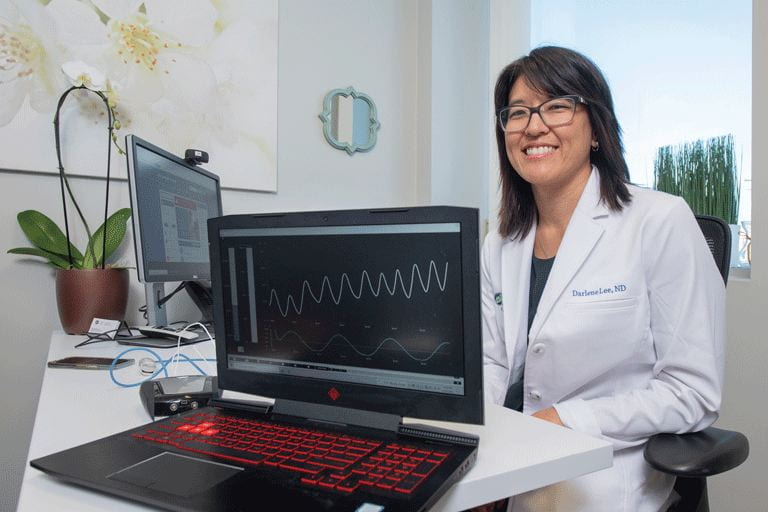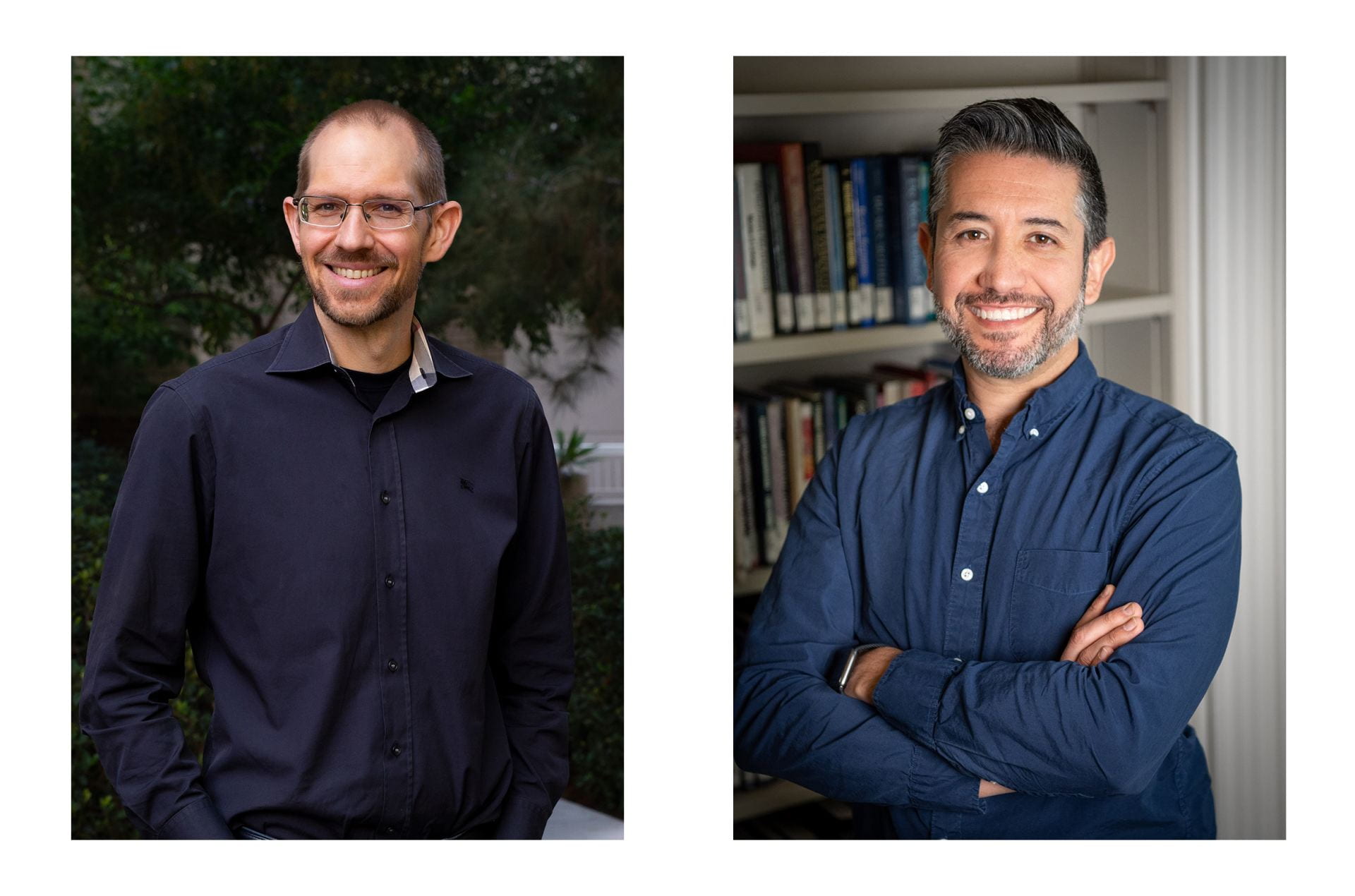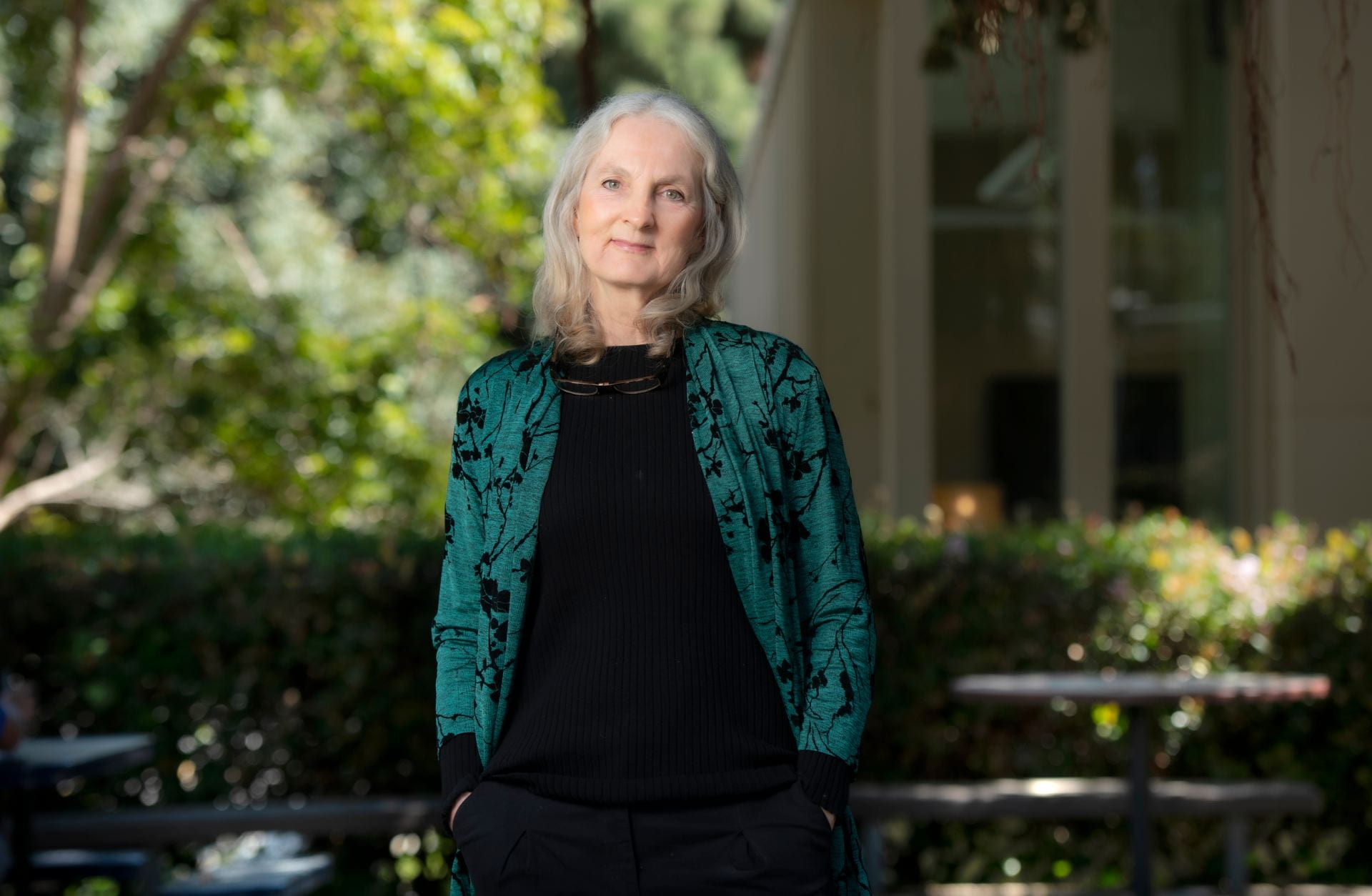A Path to Mind-Body Wellness
Popular well-being initiative born out of the pandemic for frontline workers at UCI is replicated for faculty and staff across all 10 UC campuses
We were teetering on the edge of virtual sleep success – four drowsy women and a man, all hoping desperately that the UCI Zoom session we were taking would help us toddle off to slumberland the next time we hit the sheets.
Our mentor on this afternoon call was naturopathic doctor Rowena Daly of the campus’s Susan Samueli Integrative Health Institute, where conventional medicine blends with complementary therapies to promote healthier living.
“There are things we can do on a day-to-day basis to improve our sleep health,” Daly told us. I could see others on the Zoom screen lean forward in anticipation of the sleep tips she was about to relay.
The information couldn’t come too soon for those participating, most of whom were health workers at UCI. Sleep is critical for mental health, Daly explained, noting that both lack of sleep and poor quality of sleep can cause or worsen anxiety, depression and concentration issues.
The 30-minute session is part of a well-being initiative that’s providing support services for the university’s caregivers and co-workers. The program, which has been utilized by almost 7,000 people since COVID-19 came on the scene, has been so successful that it’s been expanded to all 10 University of California campuses.
In addition to Sleep 101, Zoom sessions focus on acupressure, nutrition, mindfulness and meditation, massage, yoga and stress management strategies.
The UCI Wellbeing Initiative was developed at the Susan Samueli Integrative Health Institute shortly after the pandemic struck.
“At the beginning, we were just trying to figure out how we could use our tools and contribute,” explains Darlene Lee, a naturopathic doctor at SSIHI. “Our frontline healthcare workers were under an enormous amount of stress.”
The answer: Make stress management tools readily available to them. Lee and colleagues at SSIHI got busy, quickly developing a research project based on a remote biofeedback program. The project, financed by the UCI Joint Research Fund, moved into the field.
“We started small, with 47 people: med students, residents, fellows, nursing students – people who are very prone to stress and burnout,” Lee says. “People saw the words ‘stress management’ in the application and were immediately interested.”
In the trial, frontline workers at UCI Medical Center received a series of five 30-minute telemedicine sessions or identical in-person sessions. While analyses of the data is continuing, researchers have found that the brief, remote biofeedback sessions improved self-reported depression, anxiety and stress levels.
Telemedicine sessions are effective, Lee says, demonstrating that programs don’t need to be in person to be advantageous. That’s good news for first responders and caregivers who face future pandemics/surges, natural disasters and other emergencies.
“Long-range, there are a lot of implications for how we support healthcare workers,” Lee says. “We can use telemedicine to offer the tools we use in integrative medicine and have them, hopefully, be just as effective as in person. Giving people more access to these tools will help them weather the pandemic storm of stress.”
The program reflects what the Susan Samueli Integrative Health Institute is at its core, combining evidence-based research with well-being methods, says institute director Dr. Shaista Malik, UCI’s associate vice chancellor for integrative health.
“It’s part of our mission at SSIHI to educate our community on well-being practices and to provide resources that assist them with improving their personal health,” she says, noting that the program has received positive feedback from participating UCI staff and faculty members. “We are extremely grateful to be able to offer access to integrative health education sessions, one-on-one and group classes, information and consults as free resources to our UC community.”
I tuned into several sessions, getting a taste of managing stress through better nutrition, mindfulness and meditation, acupressure, yoga and, of course, Daly’s Sleep 101.
The first thing she asked us to consider was our sleep space: “Do you have comfortable pillows and sheets? What do you use your bed for – as a jungle gym for the kids or a giant laundry basket?”
We covered the negative effects that stress, hectic schedules, medications, caffeine, alcohol, hormonal changes, screen exposure and preexisting health conditions can have on sleep quality.
“How do you improve your sleep?” Daly asked. “Prioritize it! Stick to a consistent sleep schedule, work to reduce your stress in the hours before bed, and don’t ignore changes to your sleep quality that might suggest a deeper health issue.”
Some participants asked about waking frequently during the night, which Daly said can be common. She cited several factors that might contribute to this – a frequent one being dysregulation of blood sugar. One way to help can be to focus on protein-rich evening snacks rather than the sugar-rich ones that many people gravitate toward later in the day.
“Long-range, there are a lot of implications for how we support healthcare workers. We can use telemedicine to offer the tools we use in integrative medicine and have them, hopefully, be just as effective as in person. Giving people more access to these tools will help them weather the pandemic storm of stress.”
A guided acupressure session piqued my interest, so I tuned in for a Zoom session with acupuncturist Heather Rice, another member of the SSIHI team. She appeared seated on a mountain patio surrounded by pine trees. The scene was serene and refreshing. Acupressure sessions are 30-minute one-on-one discussions that utilize manual pressure – fingers, palms, elbows or feet – instead of acupuncture needles to promote health by addressing anxiety, stress, grief, pain, fatigue and immune support.

I told Rice my stress points were in my shoulders and neck, a common complaint for computer users. She suggested a neck extension stretch – sitting up straight and bringing my shoulders up to my ears, then exhaling while rolling my shoulders back, and finally reaching down toward the ground with my hands and looking up at the sky for 30 seconds. We progressed through several other stretches. I felt breezy and relaxed by the time we finished.
Learning how to chill out is the wellness initiative theme. All of the classes help people de-stress. Among them:
- Mindfulness sessions are livestreamed on Zoom and last 25 minutes. They give participants the opportunity to learn about meditation and mindfulness with the support of a group and an SSIHI practitioner. The training is also offered via a one-on-one phone call.
- Yoga and guided massage are covered in 25-minute one-on-one or hourlong group classes over Zoom.
- “Anxiety During Stressful Times” is a 30-minute Zoom session that helps participants become more grounded and less anxious.
- ”Healthy Nutrition in Times of Stress” is a 30-minute Zoom session with a registered dietitian who will discuss practical methods to maintain healthy eating patterns during periods of stress, anxiety and fatigue.
- Livestreamed sessions on biofeedback and relaxation techniques feature up to 10 participants and focus on calming the mind and body.
Faculty and staff members are boosters. Laura Narvaez, assistant clinical research coordinator in the Sue & Bill Gross School of Nursing, recommends that “all UCI employees sign up for at least one session because it’s helpful for stress management, it’s very accessible and you get to interact with others in real time, which is fun.”
Nutrition was a plus for Dr. Maryam Rahimi, a UCI Health internist who “truly loved the visit I had with the nutritionist. She took the time to review my diet in detail. She helped me look at food in a different way, to become more aware of hunger and fullness cues from my body and make better choices.”
And Regina Bolotin applauds the initiative because it motivated her to “live and be healthy.” A purchasing and reimbursements manager at The Henry Samueli School of Engineering, she was especially fond of the nutrition and acupressure segments.
SSIHI’s Lee, whose research has dovetailed with the well-being initiative, is looking forward to the future: “My hope is that we can offer these kinds of things to the wider community and get additional funding to make it happen for all.”



